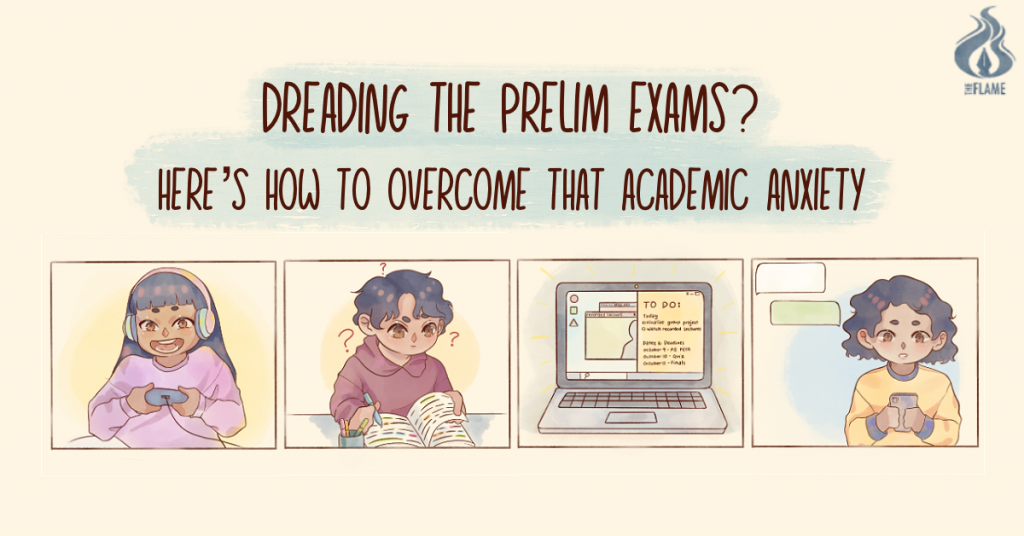
TO LEARN is not just to comply. Students may catch up in the online setting, but long-term retention of information is not guaranteed.
Academic anxiety, procrastination, and online distractions are still barriers to maximize e-learning.
As students prepare for the upcoming preliminary examinations, The Flame interviewed three Artlets on their insights and strategies for dealing with distant learning and mental burnouts.
1. Make time for self-care
One should not feel guilty for resting. For Mattew Marbella, a fourth-year political science student, resting is an effective study tip.
“Taxing yourself with too much academic burden could be counterproductive and may cause you to burn out. [You can] watch your favorite series or play your favorite game before doing your academic work,” Marbella said.
One must also maintain a comfortable pace. He added that study routine “can be as simple as one hour study then one hour rest. It’s fine as long as you don’t lose your sense of academic responsibility.”
Psychologists said having gaps between study sessions helps improve memory. It also strengthens the retrieval process of the brain.
Rewarding oneself for fruitful academic progress is also a way to take care of one’s mental well-being.
“I also learned to reward myself whenever I accomplish a personal goal. Rewards can come in many forms such as an extra time for sleep, self-care night, online shopping, or anything that makes me feel good,” said Janela Galang, a third-year communication student.
2. Love your readings (even when it’s hard)
Marbella said academic readings may be taxing but they can also be fun and interesting when students are invested in the subject.
“Think of the reading as something that will enrich your perspective, try to question it, and relate it to current world events and issues. In that way, you can unravel new things about your[self] and your surroundings,” Marbella said.
A good visualization exercise such as referring to real-life situations could aid students’ grasp of long texts.
A research from the American Psychological Association found that “interleaving,” which means comparing and contrasting two or more kinds of information, helps students understand the learning materials better.
3. Set a to-do list and avoid cramming
When conflicting schedules arise, students can keep an organized calendar to avoid forgetting their deadlines. This can also track one’s progress, particularly when reviewing a full-semester content for examinations. Planning ahead can also avoid that last-minute crunch.
Galang said, “As much as possible, avoid cramming or doing the projects or activities a day before the deadline especially if it is a task that requires a lot of time and effort.”
Jotting down goals and tasks can also declutter one’s thinking and keep a healthy mindset.
4. Don’t forget your friends
E-learning also allows for easy access to resources and collaborative learning with friends.
“I usually learn by speaking to and debating [with] my friends, so I usually chat with them or call them about a particular topic,” Jiego Tagaban, a third-year history student said.
Moreover, being virtually apart can also affect one’s enthusiasm for studying.
Tagaban admitted to being “nearly unmotivated,” but he was able to overcome it with the help of his friends
“The things that give me motivation are my friends […] I think that my fellow Artlets should continue conversing and pushing their friends. […] If you don’t have friends that don’t push you intellectually, you would be hard-pressed looking for motivation to continue using your cognition,” Tagaban added.
Additional pointers
Before you brace yourself for the examinations, you deserve to click that ‘shut down’ button and take a break from screens.
And when you are anxious about your studies, remind yourself every once in a while with these pieces of encouragement from your fellow Artlets:
“Dedicate both your heart and mind while studying, [it’s not only] a mental activity but also an emotional one in a sense. The more we invest our heart or passion in studying, the more that we are motivated to push further,” Marbella said.
Tagaban encouraged Artlets to “appreciate the small things” and avoid overloading their brains.
”You can do it [and] if you can’t, that’s okay too,” she said. F – Samantha Z. Argonza



